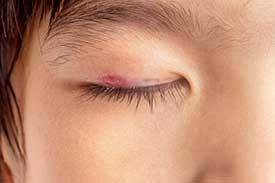Stye Treatment in Hackensack, NJ

A stye, often referred to as a sty, is the common name given to the medical condition called hordeolum. In essence, a stye is a small red bump at the corner of the eye. This bump is typically painful and often filled with pus. Many people describe a stye as similar to a pimple. A stye often accompanies eyelid inflammation , known medically as blepharitis. Most sties are benign and relatively harmless, although a serious stye can cause major discomfort.
Both preventive and reactive treatment for a stye is available. Request more information today: call (973) 777-3711 or contact Dr. Maged Boutros online.
Stye Causes
A stye forms in the corner of the eye, typically appearing as a small red bump. There are numerous reasons this bump can occur, almost all of them are related to eye health. The most common stye causes include:
- Poor eye hygiene
- Bacteria in the eye
- Eyelid inflammation (blepharitis)
Poor hygiene is the most common cause of a stye. When the eye is insufficiently clean, bacteria builds up and leads to a minor infection. That, in turn, causes the stye to form and fill with pus. Common hygienic sources of a stye include:
- Poorly cleaned contact lenses
- Frequent touching of the eye with unclean hands
- Leaving eye makeup on too long
- Using expired cosmetics
Stye Symptoms
The most common and prominent symptom is the stye itself. In most cases, a stye is immediately visible in the corner of the eye as a small red bump. This bump can vary in size depending on the severity of the infection. Sties that are very large require more immediate treatment.
People who are dealing with a stye often have other symptoms. Common signs and symptoms of a stye include:
- Eye pain
- Eyelid swelling
- Crusting
- Pain when closing or opening the eye
Symptoms typically get worse the larger a stye is.
Stye Treatment
Most sties will go away without treatment after about 48 hours. A severe stye, however, may necessitate treatment to relieve symptoms and restore health vision. When a stye becomes very large, or incredibly painful, it's important to get treatment immediately.
If a stye has not improved or has worsened after 48 hours, possible treatment options include:
- Antibiotic eyedrops
- Antibiotic creams
- Surgery
Antibiotics are thought to stem the infection and stop it from spreading to other parts of the eye. Surgery is only used as a last resort in order to remove a stye that will not burst or go away on its own. During stye surgery, which is typically provided by an ophthalmologist, the stye is lanced. This means a very small tool is used to puncture and drain the infected area.
Request More Information Today
Dealing with a serious stye can be very painful. Request more information about stye treatment today: call (973) 777-3711 or contact Dr. Maged Boutros online.
Je Lu Ja Spa
Address
1033 Us Hway 46 EastSuite G1 (Ground Floor Left)
Clifton, NJ 07013
(973) 777-3711
http://jelujaspa.com/


